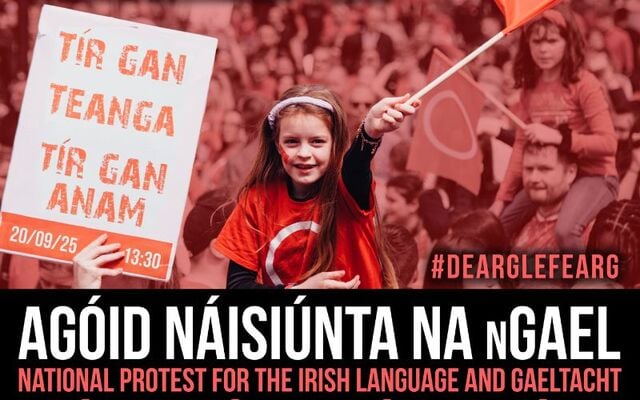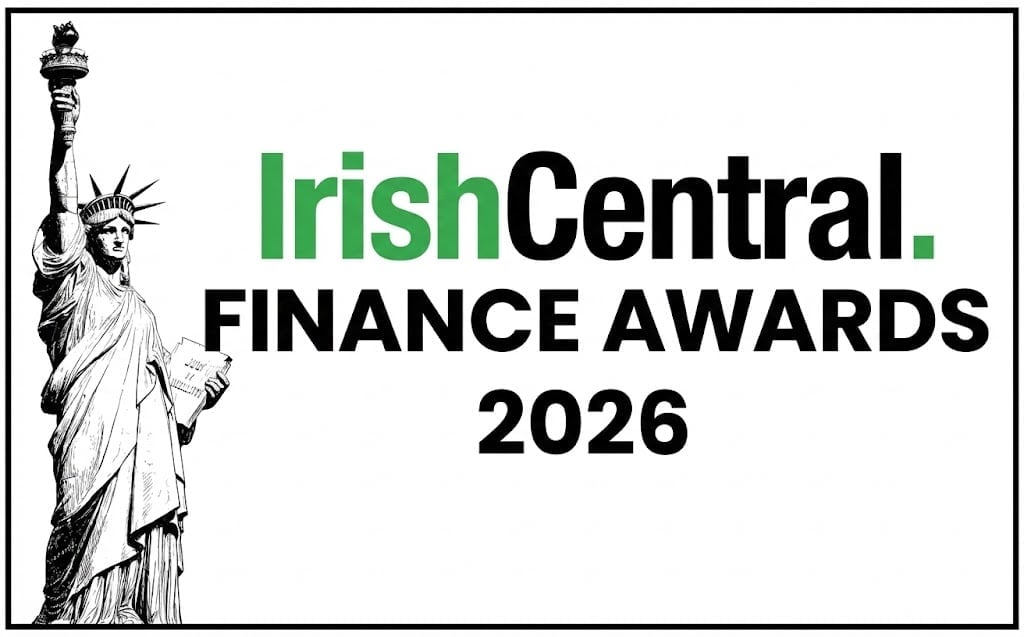‘CEARTA: A National Protest for the Irish language and the Gaeltacht' will take place on Saturday, September 20 in Dublin.
Conradh na Gaeilge, the democratic forum for the Irish-speaking community, announced the upcoming protest yesterday, Monday, June 23.
The rally will begin in Parnell Square before making its way through Dublin City Centre to convene at Leinster House for a final demonstration, organizers said.
Conradh na Gaeilge noted that the most recent national Irish language rally in Dublin was in 2014. Since then, there has been a ‘Lá Dearg’ in Belfast in 2017 and again in 2022, when up to 20,000 attended the mass protest calling for an Irish language Act.
✊CEARTA✊
🔔AGÓID NÁISIÚNTA NA nGAEL🔔Tá na Gaeil ag dul chun sráide🅾️
⏰1.30pm Satharn 20ú Meán Fómhair
📌Baile Átha Cliath🚨Maoiniú • Funding
🚨Tithíocht • Gaeltacht Housing
🚨Oideachas • Education
🚨Cearta Teanga •Language RightsCuir an dáta sa dialann #DeargLeFearg pic.twitter.com/c2IjvtS8gK
— Conradh na Gaeilge ⭕️ (@CnaG) June 23, 2025
Conradh na Gaeilge said its announcement comes off the back of a series of emergency meetings and two national ‘crisis assemblies’ earlier this year, which discussed ongoing national campaigns that have yet to be resolved by either government.
The most recent Assembly in Belfast’s Cultúrlann McAdam Ó Fiaich agreed to convene a national day of action in Dublin, where the following major campaigns would be brought together:
Call to Action 1: Funding
That both governments recognise the historic underfunding of the Irish language and the Gaelacht, and the resulting diminution of language rights as a result of this, and that adequate funding be provided to the respective language agencies so they are in a position to ensure the Irish language and Gaeltacht communities are fairly resourced.
Call to Action 2: Gaeltacht Housing
To ensure that Gaeltacht communities retain the right to live in their local areas and to save and protect the Irish language as the everyday community language in those areas.
Call to Action 3: Education
That all school students will have the right, and that the necessary provision is made available by both Governments, to attend Irish Medium Education & that all school students will also have the right, and the necessary provision is made available, to learn Irish in a holistic system in English-medium schools.
Call to Action 4: Language Rights
That all Irish language rights, legislation and all outstanding government and political commitments achieved over recent years are implemented without any further delay
"The Irish language faces huge hurdles"
Ruairí Ó Donnáin, Irish language Development Officer from Lower Mourne, Boirche Íochar in Co Down, who is one of many national organisers of the September rally, said: “Irish language and Gaeltacht groups have been advocating and organising for change for years.
"As time has passed, it has become increasingly clear to us that we are moving from crisis to crisis in an era that will define the future of our language for decades to come.
"We are in the midst of a funding crisis across the island. There is a housing crisis in the Gaeltacht. The Irish language faces huge hurdles in education on both sides of the border, and we continue to await the full implementation of language rights both in Belfast and in Dublin.
"The two Governments must recognise and resolve all of these critical issues. It is our job to make sure they do so. We cannot continue this conveyor belt of delay, crisis, failure, disregard or hostility towards the language.
"In September, we will march for our rights. We will march for the future of the Irish language and our Gaeltacht communities.”
"We will no longer stand for the current system"
Speaking about the Gaeltacht Housing crisis, Cristín de Mórdha, Irish Language Planning Officer from Daingean Uí Chúis, said: “Gaeltacht communities have long been highlighting and challenging the housing crisis that is ravaging our local areas, and destroying the Irish language as our everyday spoken community language as result.
"On one hand, the state claims it is supporting the language planning process in the Gaeltacht, but on the other hand, that same process is being undermined by the Government’s housing policy that is facilitating the systematic destruction of our Gaeltacht communities.
"It is these Gaeltacht communities that retained and saved the language throughout centuries of colonisation, of famine, of emigration - but those communities are now in the midst of an existential crisis due to a housing system that could be easily changed if the political will existed to do so.
"We will march in September to send a message to the Government that we will no longer stand for the current system, that we expect substantial reforms to the state’s housing policy in the Gaeltacht that will allow and encourage the emerging Gaeltacht community to stay and live in their native areas.”
The "next chapter"
In a call to action, Ciarán Mac Giolla Bhéin, President of Conradh na Gaeilge, and Chairperson of the National Language Planning Forum, has said: “There is no action as powerful as thousands of Gaels taking to the streets together to march for their rights.
"We have seen this time and time again throughout the history of the language and the Gaeltacht, when we stand together, when we march together, when we challenge the government, north or south, when we demand change, we can and have made significant progress and achieved major victories.
"We only have to recall the pioneers who led the charge of the Gaeltacht Civil Rights Movement, the gains of Dublin rallies, and the historic Dream Dearg movement over recent years. We know we have the collective power to challenge the status quo and change the world around us.
"The next chapter in the history of this mass movement has been set for 20th September in Dublin. If we are to bring both states to the point where they have no option but to take serious actions on each of these issues, it is up to us to show them that we will not stop until that happens.
"It is now time for the governments to address years of neglect and immediately work to finally deliver equality, fairness, and respect for the Irish language and the Gaeltacht.”




Comments